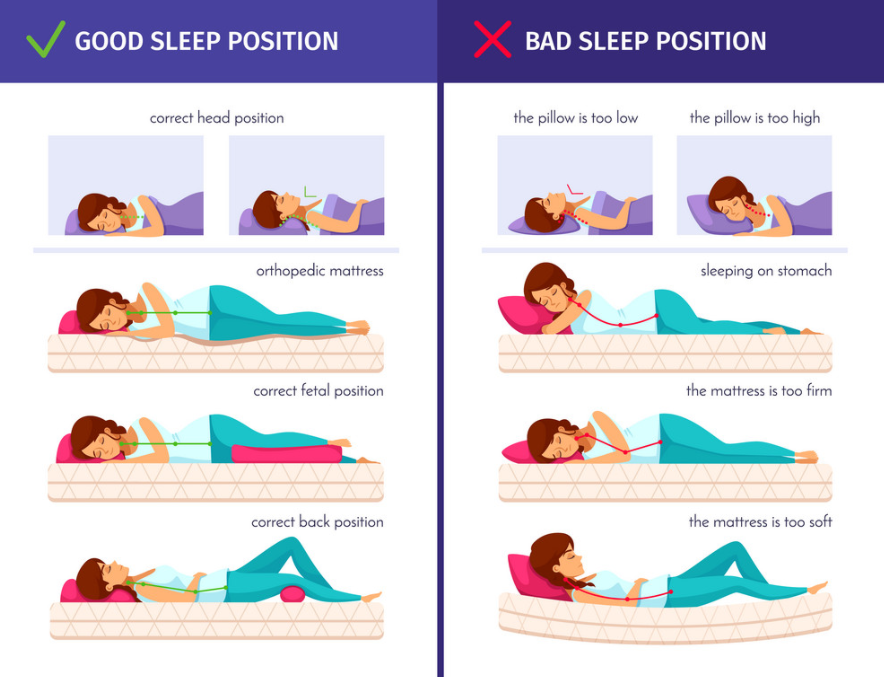Sleep Talk Blog, Health & Wellbeing
How Do I Know If My Mattress Is Causing My Back Pain?
Waking up with backache happens to the best of us, but it can significantly impact our lives when it happens regularly. Not only does it restrict mobility, but it also affects sleep and can snowball into a vicious cycle.
Chronic back pain can lead to decreased productivity, irritability, and a general decline in quality of life, making even simple daily tasks feel like monumental challenges.
But why do we wake up with backache? There are several potential causes. Let's take a look at them and see what's what, exploring each factor that could be contributing to your morning discomfort.
Strenuous activities
If you wake up with backache spontaneously and don't have problems often, it's probably because of activities you performed the previous day. This type of pain, often called delayed onset muscle soreness (DOMS), typically manifests 24-48 hours after physical exertion.
Lifting something heavy or even bending down to pick something up can work muscles that haven't been worked in a long time. Even seemingly simple activities like gardening, moving furniture, or playing with children can strain your back muscles if you're not accustomed to such movements.

When you overexert yourself, you damage and break down muscle fibres, which causes soreness in the muscles until those fibres heal. During sleep, damaged muscles also suffer inflammation, which aggravates injuries.
This natural healing process, while uncomfortable, is actually your body's way of building stronger muscles and improving their resilience for future activities.
Think about what you did yesterday. If you can recall something that could have damaged your back, it's probably that.
Pay attention to any unusual activities or movements that might have triggered the discomfort.
Bad/unsupportive mattress
If you wake up with backache often, your mattress is probably to blame. It could be past its best or is no longer supporting how you sleep. A mattress that's too old or inappropriate for your sleeping style can lead to chronic back issues and poor sleep quality, affecting your overall health and well-being.
There is no harm in sleeping on your back, side, or front so long as your mattress provides adequate support for your sleeping position. Front and side sleepers need a soft to medium mattress, while back sleepers need a firm mattress.
This is because different sleeping positions create different pressure points and require varying levels of support to maintain proper spinal alignment.

Most people suit a medium or medium-firm mattress, although a medium-soft mattress is best if you weigh less than 130 lbs. The heavier you are, the firmer the mattress should be. This relationship between body weight and mattress firmness is crucial for maintaining proper spinal alignment and preventing morning backache.
If your mattress is over ten years old, it is time to replace it. Mattresses break down naturally over time, and your sleeping positions might have changed. Regular mattress replacement is an investment in your health and comfort that shouldn't be overlooked.
Improper use of pillows
Pillows don't directly cause back pain, but they can if you don't use them properly. The right pillow configuration is essential for maintaining proper spinal alignment and preventing unnecessary strain on your neck and back muscles.

Most people only need one firm pillow to support their head and a softer pillow to sit up against or cover their head with. Sleep experts say you should only have one pillow under your head to support your neck. This recommendation is based on extensive research into sleep ergonomics and spinal health.
Sleeping with two pillows is fine if the pillows are soft since these compress to deliver the same support as a firm pillow anyway. However, it's important to ensure that the combined height of the compressed pillows maintains proper alignment between your head, neck, and spine.
Elevated sleeping can cause neck and upper back pain because it forces you into an unnatural sleeping position. It would help if you avoided elevated sleeping whenever possible. Don't pile up pillows, or else you risk backache. This is particularly important for those who tend to prop themselves up while reading or watching television in bed.
Sleeping positions
Waking up with back pain is remarkably common, especially in the lower back due to the nature of how we sleep, where our hips are unsupported. This places pressure on the lower spine and stretches the muscles in our backs.
The position we maintain during those long hours of sleep can significantly impact how we feel upon waking, making it crucial to understand and optimise our sleeping posture for better spinal health.
Poor sleeping positions (and poor posture) can significantly impact your spinal health and contribute to persistent back pain. When you maintain improper alignment during sleep, it places excessive pressure on your spine and hips, potentially leading to chronic discomfort.
Back Pain and Sleep Positions, Pillow Support Recommendations

Picture credit: Spinehealth.org
Furthermore, awkward sleeping positions can result in temporary numbness or tingling sensations in your arms or legs, commonly known as paraesthesia (pins and needles), when you inadvertently compress nerves and blood vessels by placing too much weight on these limbs.
One of the most problematic and frequently observed sleeping positions is what sleep specialists refer to as the 'wonky' position, whether on your back or front. In this position, your hips rotate your legs sideways while your upper body remains relatively straight.
This misalignment creates a twisting force through your lower spine, potentially leading to muscle strain and lower back pain. Over time, this position can contribute to chronic back issues and may even affect the natural curvature of your spine.
For those experiencing backache, there are several recommended sleeping positions that can help alleviate discomfort and promote better spinal alignment. When sleeping on your back, placing a supportive pillow underneath your knees creates a natural curve in your lower back, effectively distributing pressure along your spine.
This position helps maintain the spine's neutral position and reduces strain on your lower back muscles and ligaments. For front sleepers, positioning a slim pillow under your lower abdomen and hips can help maintain better spinal alignment and minimise the stress placed on your back muscles during sleep.

Possible medical causes
While waking up with back pain often occurs spontaneously, various medical conditions can contribute to morning discomfort, ranging from common ailments like colds to more serious conditions such as arthritis. Understanding these underlying medical causes is crucial for proper treatment and management of back pain.
The most common medical causes include:
Colds and flu - These viral infections can trigger systemic inflammation, leading to muscle aches, shivers, and pronounced pain along your spine. The discomfort is often exacerbated by prolonged periods of immobility during sleep, making morning pain particularly noticeable.
Muscle or ligament damage - This can result from various activities such as improper lifting techniques, accidental falls, or sudden movements that overextend your spine, like awkwardly exiting a vehicle. The damage can range from minor strains to more serious sprains requiring medical attention.
Arthritis - Particularly osteoarthritis, which commonly affects the lower back region. While this condition is more prevalent in individuals over fifty, it can develop earlier, especially in those with a history of joint injuries or who engage in high-impact activities.
In some instances, back pain can indicate more serious underlying medical conditions that require immediate professional attention. It's essential to seek medical advice from your GP if you experience severe or persistent back pain, especially if it's accompanied by other symptoms such as numbness, tingling, or weakness in your limbs.
Additionally, if your back pain is chronic (lasting more than three months) or significantly impacts your daily activities, professional medical evaluation is strongly recommended to determine the root cause and develop an appropriate treatment plan.

